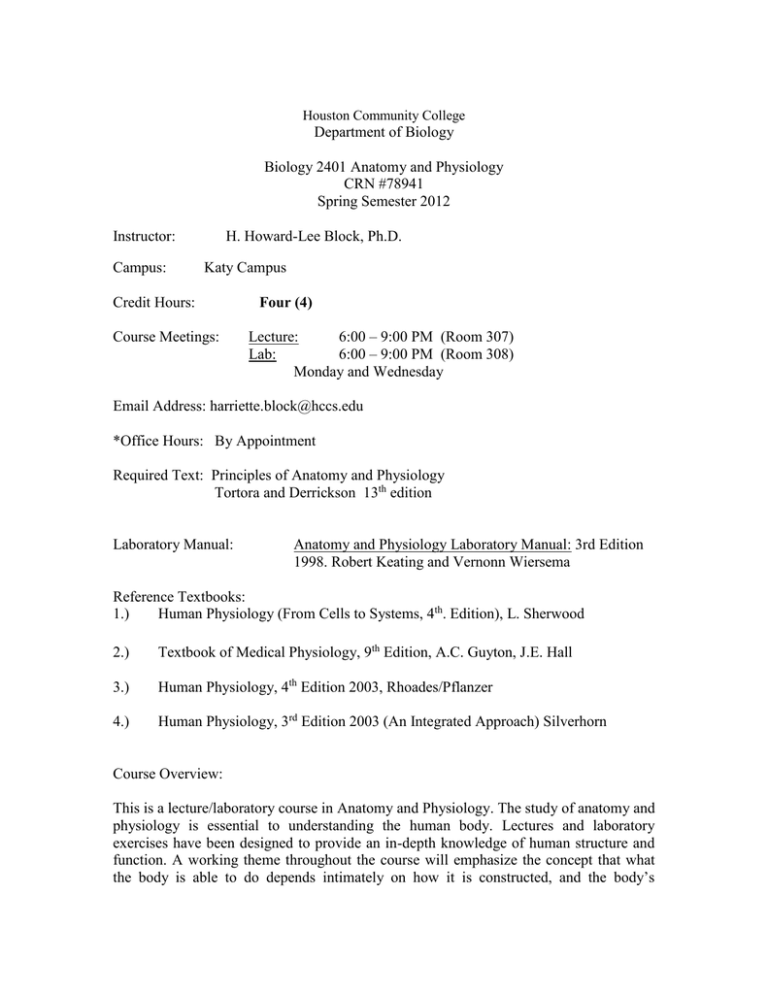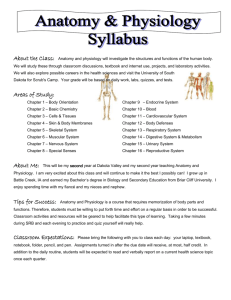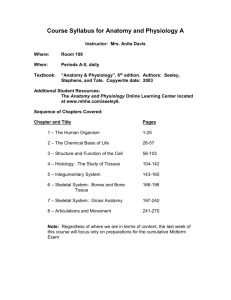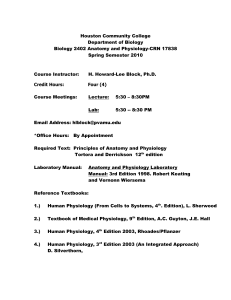AP - Biol 2401 Syllabus Spring HCC 2012.doc
advertisement

Houston Community College Department of Biology Biology 2401 Anatomy and Physiology CRN #78941 Spring Semester 2012 Instructor: Campus: H. Howard-Lee Block, Ph.D. Katy Campus Credit Hours: Course Meetings: Four (4) Lecture: 6:00 – 9:00 PM (Room 307) Lab: 6:00 – 9:00 PM (Room 308) Monday and Wednesday Email Address: harriette.block@hccs.edu *Office Hours: By Appointment Required Text: Principles of Anatomy and Physiology Tortora and Derrickson 13th edition Laboratory Manual: Anatomy and Physiology Laboratory Manual: 3rd Edition 1998. Robert Keating and Vernonn Wiersema Reference Textbooks: 1.) Human Physiology (From Cells to Systems, 4th. Edition), L. Sherwood 2.) Textbook of Medical Physiology, 9th Edition, A.C. Guyton, J.E. Hall 3.) Human Physiology, 4th Edition 2003, Rhoades/Pflanzer 4.) Human Physiology, 3rd Edition 2003 (An Integrated Approach) Silverhorn Course Overview: This is a lecture/laboratory course in Anatomy and Physiology. The study of anatomy and physiology is essential to understanding the human body. Lectures and laboratory exercises have been designed to provide an in-depth knowledge of human structure and function. A working theme throughout the course will emphasize the concept that what the body is able to do depends intimately on how it is constructed, and the body’s construction gives a strong indication of what it does. The physiological principle of homeostasis will be utilized to show how the “normal” interaction of structure and function is achieved and maintained by dynamic counterbalancing forces. This is an introductory course, and will serve as a foundation for students pursuing careers in the biomedical sciences. The text for this course is comprised of twenty nine chapters, which have been divided into five units. Lecture material for BIOL 2401 will cover material(s) from chapters 1-4 (Unit 1), chapters 5 – 11 (Unit 2) and chapters 12 – 13 (Unit 3). Unit 1: Provides the foundation for the study of anatomy and physiology. Chapters in this unit focus on the orientation and organization of the human body, the mechanisms of body function from cell to systems. The concept of homeostasis-how the body meets the changing demands while maintaining the internal constancy for all cells and organs to function is introduced. Chapters in this unit are concerned with the systems that provide support (Integumentary), protection (Skeletal) and movement (Muscular) for the human body. Chapters in this unit are concerned with control Systems of the Human Body. Unit 2: Unit 3: Attendance: Attendance will be taken at each class meeting. You are responsible for the information in class, whether your absence is excused or unexcused. Please provide documentation of your absence if you desire an excused absence. If you are absent for a lab assignment, you will not be given any credit for the missed lab. Withdrawals: The last day to withdraw from this class is 3/29/12. After that date, withdrawal is not permitted and students must receive a final grade. If you are unable to complete the course, IT IS YOUR RESPONSIBILITY TO DROP OR WITHDRAW FROM THE CLASS ON OR BEFORE THE LAST DROP DATE. Grading: The final letter grade for this course will reflect each student’s performance on the following (total points accumulated): 1) 2) 3) Three (3) Lecture Exams Laboratory Quizzes/Exercises (Averaged to 1 exam) Final Exam Academic Honesty: Cheating during an exam will result in an automatic zero (0) for that exam. Dishonesty is grounds for dismissal from HCC. Additional Information: Cell Phones are very distracting and are not allowed in the classroom at Houston Community College. My e-mail address is listed on the syllabus; your e-mail will be answered in a timely manner. As an Adjunct Professor, I am not available during regular operational hours. Therefore, I am available after class for appointments or meetings. Disability (ADA) Houston Community College has provided the least restrictive environment for all students. We strive for excellence in providing equity for all students through accommodations as required by the Vocational Rehabilitation Act of 1973, Title V, Section 504 and the Americans with Disability Act of 1990 (ADA), this act enables students with disabilities to benefit from all post-secondary activities. If you require any accommodation because of physical, mental or learning disability, please contact the Dean for Student Services who will provide you with the forms you need to request accommodations. Please turn these forms in to the Professor at the beginning of the class to arrange for those accommodations. Make-up Exams: Make-up exams will only be given after receiving a validated excuse. The instructor will schedule all make-up exams. Failure to take the make-up exam on the scheduled date (for any reason) will result in a zero for that exam (no exceptions). PLEASE NOTE “Students who repeat a course for a third time or more times may soon face significant tuition/fee increases at HCC and other Texas public colleges and universities. Please ask your Professor/Counselor about opportunities for tutoring or other assistance prior to considering course withdrawal or if you are not receiving passing grades” Learning Outcomes: 1. Demonstrate knowledge of the levels of structural organization. 2. Demonstrate knowledge of basic chemistry. 3. Demonstrate knowledge of cells and tissues. 4. Demonstrate knowledge of the Integumentary System. 5. Demonstrate knowledge of the Skeletal System. 6. Demonstrate knowledge of the Muscular System. 7. Demonstrate knowledge of the Nervous System. 8. Demonstrate knowledge of the Special Senses Dates to remember: Jan 17th Classes Begin, Drop/Add/Swap fee begin March 29th Feb 20th Last Day for Administrative and student withdrawal by 4:30p.m President’s Day Holiday March 12th- 18th Spring Break April 6 – 8th Easter May 6th Instruction Ends May 7-13th Final Examinations May 18th Grades Available to students Final exams for students will be given at the normal class hour on the meeting date. Tentative Schedule Week Day 1 Course Overview-Chapter 1 The Human Body 2 Chapter 1 and 2 Homeostasis/Chemical Level of Organization 3 Chapter 3 Cellular Level of Organization 4 Exam I (Chapters 1-3) 5 Chapter 4 Tissue Level of Organization 6 7 Chapters 4 and 5 Integumentary System 8 Chapter 5 Exam II 9 Chapter 6 Skeletal System: Bone tissue 10 Chapters 6 and 7 Skeletal System: Bone tissue and Axial Skeleton 11 12 Chapter7 and 8 Appendicular Skeleton Exam III 13 Chapters 9 and 10 Joints and Muscular Tissue 14 Chapters10 and 11 Muscular System 15 Exam IV 16 Chapters 12 and 13 Nervous Tissue and Spinal Nerves Final Exam Course Grade Assignment: Lecture Grade A Final Average in Percent 90-100% B 80-89% C 70-79% D 60-69% F 0-59%



